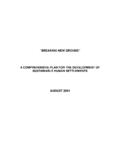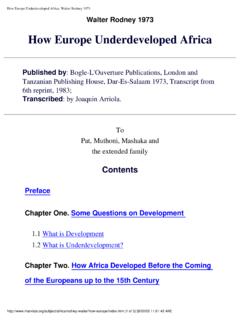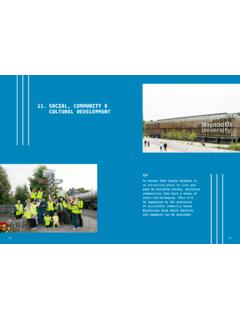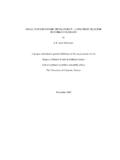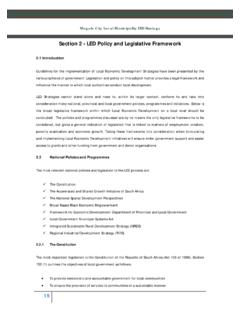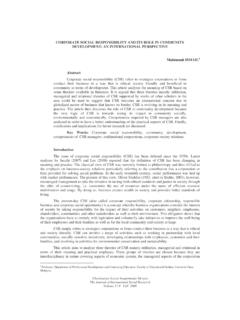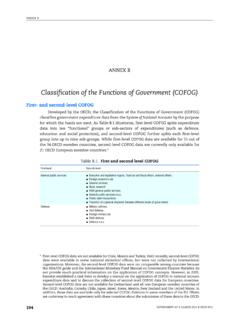Transcription of NATIONAL DEPARTMENT OF HOUSING NATIONAL …
1 NATIONAL DEPARTMENT OF HOUSING NATIONAL HOUSING programme : upgrading OF informal SETTLEMENTS October 2004 (Final version) PART 3: NATIONAL HOUSING PROGRAMMES: upgrading OF informal SETTLEMENTS CHAPTER 13: PART ONE: POLICY .. 3 3 POLICY INTENT .. 4 Objectives of the programme .. 4 Principles of the programme .. 6 APPLICATION OF THE programme ..10 Definition of informal Settlements ..10 Aplication of the programme ..11 Eligibility ..12 The phased development Phase 1: Phase 2: Project Phase 3: Project Phase 4: HOUSING MUNICIPAL COUNTER Capital counter Maintenance and operational funding.
2 19 FUNDING Dedicated The release of allocated and approved project funding ..21 INSTITUTIONAL ARRANGEMENTS ..22 Responsibilities of municipalities ..22 Responsibilities of Responsibility of the NATIONAL DEPARTMENT of MEMORANDUM OF Undertaking required from municipality ..25 SELECTION OF PERFORMANCE NATIONAL HOUSING CODE Page 3 NATIONAL HOUSING POLICY NATIONAL HOUSING PROGRAMMES UNDERSTANDING THE HOUSING ACT & administrative procedures USER FRIENDLY GUIDE CHAPTER 13: upgrading OF informal SETTLEMENTS This Chapter deals with the rules for the in situ upgrading of informal settlements. These rules relate to the provision of grants to a municipality to enable it to upgrade informal settlements in its jurisdiction in a structured way and on the basis of a phased development approach.
3 The grant funding so provided will enable the municipality to fast track the provision of security of tenure, the provision of basic municipal engineering services, the provision of social amenities and the empowerment of informal settlement inhabitants to take charge of their own HOUSING development. Part One: Policy Overview The Government's primary HOUSING objective is to undertake HOUSING development, which section 1 of the HOUSING Act, No. 107 of 1997 ("the HOUSING Act") defines as being "the establishment and maintenance of habitable, stable and sustainable public and private residential environments to ensure viable households and communities in areas allowing convenient access to economic opportunities, and to health, educational and social amenities in which all citizens and permanent residents of the Republic will, on a progressive basis, have access to: permanent residential structures with secure tenure, ensuring internal and external privacy, and providing adequate protection against the elements, and potable water, adequate sanitary facilities and domestic energy supply.
4 The existing NATIONAL HOUSING programmes have been based on this objective and the principles embodied therein. Despite the provision of more than million houses in the decade since 1994, the backlog has continued to grow. Because of fiscal constraints and delivery capacity, the Government has accepted that it can only accomplish the delivery of HOUSING to all in need on a progressive basis. This takes place within a structured programme based on priorities, fiscal constraints and achievable time frames. In his 2004 State of the Nation Address, the President committed government to the task of building a People s Contract for the eradication of poverty and underdevelopment and the improvement of the quality of life of people, taking care to NATIONAL HOUSING CODE Page 4 enhance the process of social cohesion and recognizing the critical importance of local government.
5 The President has indicated that a comprehensive programme dealing with human settlement and social infrastructure should be prepared. Delivery of HOUSING through the HOUSING Subsidy Scheme has on average kept pace with new household formation but did not made inroads into existing backlogs. In addition the latest statistics released by Statistics South Africa indicated above expected growth in household formation. While the percentage of households living in informal dwellings since 1994, has remained constant at about 16% of the total population (SA Statistics: 2001 Census) the number of households without formal shelter has increased by 326 976 between 1996 and 2001 (SA Statistics: 2001 Census).
6 Most of the informal settlements are situated in the biggest cities in South Africa and the total estimated number of households of who lived in informal settlements in 2001 amounted to 1,376 705 (SA Statistics: 2001 Census). The bulk of this backlog is located at the lowest end of the income spectrum. The United Nations Millennium Development Goals seeks to achieve a significant improvement in the lives of 100 million slum dwellers internationally by 2020 and the Millennium Development Goals provide a useful basis for South African target setting. It is projected that informal settlements will continue to grow at 4% per annum in line with existing urbanisation trends but that this will slow to 3% after 2010.
7 The total number of households in informal settlements which would need to be upgraded over a period of 15 years is estimated to be in the region of million. This sets a target for the upgrading of approximately 193 000 households per annum over a period of 15 years. As the current HOUSING subsidy programme were not specifically designed and geared for informal settlement upgrading , this programme is instituted in terms of section 3(4) (g) of the HOUSING Act, 1997, and will be referred to as the NATIONAL HOUSING programme : In Situ upgrading of informal Settlements. Assistance takes the form of grants to municipalities to enable them to respond rapidly to informal settlement upgrading needs by means of the provision of land, municipal services infrastructure and social amenities.
8 It includes the possible relocation and resettlement of people on a voluntary and co-operative basis in appropriate cases as a result if upgrading projects. This Chapter describes and provides guidelines and rules about the steps to be taken when in situ upgrading projects are to be undertaken. Policy Intent Objectives of the programme The main objective of this programme is to facilitate the structured upgrading of informal settlements. The challenge of informal settlement upgrading must be approached from a pragmatic perspective in the face of changing realities and many uncertainties. informal settlements should also not be viewed as merely a HOUSING problem , requiring a HOUSING solution but rather as a manifestation of structural social change, the resolution of which requires multi-sectoral partnership, long-term commitment and NATIONAL HOUSING CODE Page 5 political endurance.
9 At the outset therefore, a paradigm shift is necessary to refocus existing policy responses towards informal settlements from one of conflict or neglect, to one of integration and co-operation. This programme promotes the upgrading of informal settlements to achieve the following complex and interrelated policy objectives: Tenure Security The programme aims to enhance the concept of citizenship, incorporating both rights and obligations, by recognising and formalising the tenure rights of residents within informal settlements wherever feasible. This process seeks to vest access and usage of physical land assets in the hands of the urban poor, reducing their vulnerability and enhancing their economic citizenship and capability.
10 Tenure security is also intended to normalise the relationship between the state and the residents of informal settlements. This situation may be complicated by a variety of factors including the presence of illegal immigrants. Health and safety: The programme promotes the development of healthy and secure living environments by facilitating the provision of scaleable, affordable and sustainable municipal engineering infrastructure to the residents of settlements. In so doing, the programme not only restores dignity to the urban poor, but also builds human capital by enhancing the productivity of labour and reducing vulnerability to disease. The provision of municipal infrastructure has the benefit of reducing the negative impacts of informal settlements on the natural environment.
